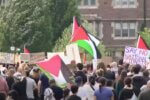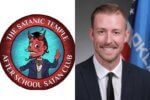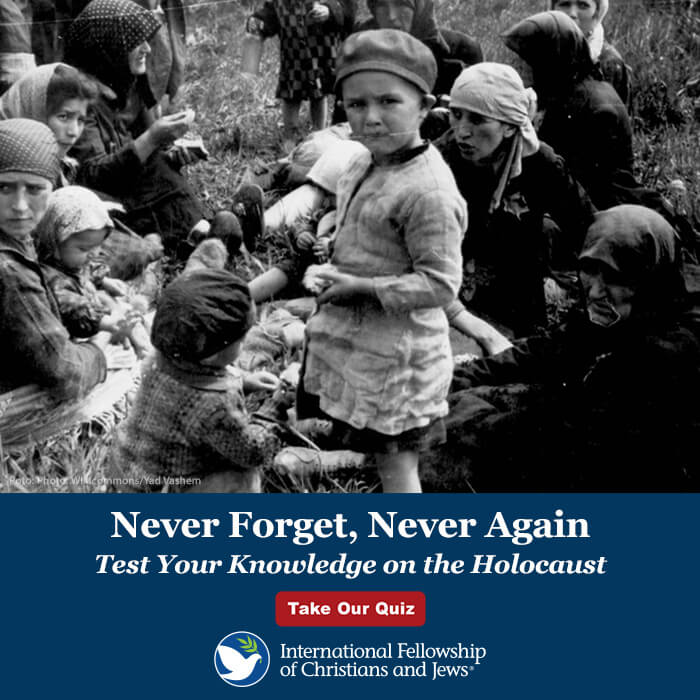Concerned parents are alarmed that the International Church of Christ tells vulnerable students they must be baptized in their churches and follow their strict rules to find salvation.
Sophomore Chris Lee had known nothing but success. Athletic, intelligent and handsome, Lee had been a high school valedictorian. Now he was a straight-A student at Massachusetts Institute of Technology (MIT), the most prestigious engineering university in the United States, double-majoring in aeronautics-astronautics and electrical engineering and on the fast track to becoming a NASA space-shuttle mission specialist.
“My idol of sorts was success,” Lee explains. “And I felt empty. I had experienced all this success, and I began saying that there must be something more.”
He began a quest to find spiritual fulfillment, but he had no idea how painful the journey would be.
After attending church as a child, Lee had given atheism and agnosticism two-year trial runs and found them inadequate. He systematically studied each major world religion and finally concluded that only Christianity represented truth.
But he struggled with hate and unforgiveness. Old grudges kept him from giving himself completely to Jesus, and his connection with Christianity was only intellectual.
A friend from the MIT Symphony Orchestra invited Lee to a dinner with members of a group called the Boston Church of Christ. Lee was intrigued by the overt spirituality of the group as they prayed over the food and talked openly about God. After dinner, they watched the Kevin Costner film Dances With Wolves.
“They said it was about a man who was searching, and they asked me about my own spiritual quest,” Lee says.
Hungry for answers and eager to
connect with Christians, Lee accepted an invitation to study the Bible the next day and began studying the First Principles series created by International Churches of Christ founder Kip McKean. He finished in nine days and was immediately baptized.
Because of his intellect and zeal, Lee began to make converts of his friends. In less than a year, he was made a leader of a Bible Talk group, a weekly one-hour lesson and discussion group designed to incite personal interest in the International Churches of Christ (ICOC).
Lee had finally found a degree of spiritual fulfillment, but now areas of his personal life seemed to indicate that something else was wrong. His grades started plummeting, then he began failing classes. He spent less and less time talking with his parents.
At the urging of church leaders, he spent 35 to 40 hours a week in church activities, and the load was taking a physical toll. When he contracted pneumonia and began missing meetings, church leaders scolded him, saying: “You need to be at church. You need to fellowship with the body. Where is your heart?”
Lee also was growing disillusioned with some of the church practices, which he now describes as being increasingly “unhealthy, controlling, manipulative and obsessed with recruitment.” He began questioning church leaders and found that his concerns were shared by others who were unable or unwilling to address them. So he wrote an 11-page paper that summarized his concerns and hand-delivered it to church leaders.
The response from the Boston Church of Christ was swift and uncompromising: Lee was stripped of his leadership and advised to spend some time learning to “be a disciple.” At the same time, his immersion in church activities had taken such a toll on his academic performance that MIT asked him to take a yearlong leave of absence to get his life together.
Lee retreated into clinical depression, and his world shattered. “At first, I thought it was all my fault, I felt ashamed, and I took all the blame. But I began to realize that there were real problems, real issues here. There was a lot of manipulation, a lot of high-pressure tactics.”
Following the Leader
The International Churches of Christ, known alternately as the Boston Movement, the Crossroads Movement, ICOC and the ICC, began as a splinter group of the mainline Churches of Christ. Its leaders were heavily influenced by the discipling, or “shepherding,” movement that sprang up in the 1970s. This produced a particularly rigid, legalistic approach to interpreting and implementing Scripture.
The earliest roots of the church can be traced to a Campus Advance outreach to the University of Florida campus in Gainesville, Florida, led by Chuck Lucas, a campus minister at Crossroads Church of Christ.
Lucas began employing the shepherding methods first advanced in Robert Coleman’s Master Plan of Evangelism, which emphasized mentor-based discipleship involving a total commitment to God, the church and the discipling process. The approach was successful in attracting new converts, and Crossroads and the churches that followed its example became the fastest-growing churches in the Church of Christ.
By 1979, the Crossroads affiliated churches and the rest of the Churches of Christ had entered into irreconcilable conflict over the discipling tactics. At the same time, a young, charismatic minister named Kip McKean took over headship of the small, dying Boston Church of Christ congregation and quickly turned it into the center of the discipling movement and the
new model for church growth.
By 1982, the Boston Church had planted large, growing churches in London, New York and Chicago. In 1987, Flavil Yeakley, Ph.D., a researcher who was a member of the Boston Church, did a study of its membership that showed an extreme level of “personality
shift” of its members toward the personality orientation of McKean. When Yeakley published the results of the study, he was expelled from the church, and members were forbidden contact with him.
A few months later, McKean demanded a “reconstruction” of all Churches of Christ, calling for them to replace their leadership with Boston-trained leaders. Most of the Boston-affiliated churches capitulated, but a few refused. This marked the beginning of ICOC’s final break with the mainline Churches of Christ, although the ICOC did not formally adopt a new name until 1993.
McKean moved himself and the church headquarters to the Los Angeles church in 1990, and the move was quickly followed by a decade-long explosion in church plantings and in the size of the churches. Worldwide, ICOC estimates 130,000 members worldwide and an average Sunday morning attendance of 200,000.
Although ICOC has been extraordinarily successful in planting new churches and in winning new recruits, it has been less successful in keeping members. According to ICOC spokesman Al Baird, there are approximately two ex-members for every current member of the church.
ICOC has come under heavy scrutiny from student-affairs departments at colleges and universities in the last five years. At least 39 institutions, including Boston University, Harvard and Georgia State have banned the organization at one time or another, citing harassment of members and potential recruits, coercive and manipulative behaviors, and overly aggressive recruiting tactics that disrupt campus life.
Baird takes exception to the accusations. “We do not condone harassment, and we do not
believe in controlling people,” he says. “A lot of times, especially in dealing with college students, it is hard for someone to say no. It can become, in your mind, harassment, but really it’s just you not saying no.”
Margaret Singer, Ph.D., a retired University of California-Berkeley professor and author of Cults in Our Midst, says that college freshmen away from home for the first time are among the easiest targets for ICOC recruiters, many of whom themselves are recent converts. They are looking for friends, meaning in life and a place to belong, and the church meets each of these needs.
Scores of support groups such as Reveal, a San Francisco-based organization of ex-ICOC members, have sprouted independently of one another for the tens of thousands of ex-members who have fled the church. Their stories have hauntingly similar themes: Vulnerable people at difficult, transitional periods in life are approached by friendly peers who invite them to Bible studies.
They convert, are baptized and begin immersing themselves in church activities, spending an average of 15 to 20 hours a week in studies, group dates and evangelistic outreaches. Along the way, they begin severing bonds with family members, losing interest in school and work, and becoming more and more dependent on church leaders and personal “disciplers” who act as spiritual guides and mentors.
Making Disciples
This discipling process is at the core of the ICOC methodology. Each member is expected to become a disciple, giving a total commitment to the church. The “discipler,” or mentor, and the leaders of the group “help” the disciple to make major decisions about college, marriage and career. The ICOC process of disciple-making is rooted in the First Principles study series, an intense, interactive, small-group study that draws on written materials and cassette tapes developed by McKean.
According to James White, a former ICOC Bible Talk and singles-group leader who helped plant an ICOC congregation in Stillwater, Oklahoma, the First Principles series is “essentially designed to tear you down, then build you up.”
White says that each study has a theme that builds on the study before, with the practical result being dependence upon the church and adherence to ICOC orthodoxy. “The Word study is very similar to the Jehovah’s Witnesses’ program,” White claims. “The underlying theme is that the ICC’s interpretation [of the Bible] is the only interpretation.
“The Discipleship study is designed to convince the students that no matter their background, they are not Christians, because water baptism is a condition of salvation, and you can’t be baptized until you are a disciple. And you can’t be a disciple until you finish the ICC’s discipleship program.”
Throughout the First Principles series, leaders stress recruiting. “The big thing in the ICC is quotas,” White says. “They say: ‘We’ll have a push this week. We’ll reach out to 10 people each day.’ Then you have to call your leaders each day and give a report. If you didn’t meet your quota, you sinned against God.” White says the church takes an extreme position on the kingdom of God (see Matt. 6:33).
“It means you have to be at absolutely every church function, no matter what–ahead of your job, ahead of school, ahead of your family,” he explains. “[ICOC] would even try to discourage you from seeing your family because a lot of people don’t come back after they see their families.”
The fourth First Principles study, titled Light and Darkness, is among the most controversial. It begins with the group leader confessing and enumerating each of the sins of his past, in great detail, and often with a heavy emphasis on sexual sins. According to White, each group member is then encouraged to make his own “sin list.”
Jessica Whitaker, a licensed social worker and former member of the Berkeley and San Francisco churches, says that her sin list was used against her by church leaders when she began questioning church tactics, and she believes that the list was circulated among the leaders without her permission.
In an interview with Charisma, ICOC spokesman Baird at first denied the use of sin lists, saying, “We do not make sin lists; we do not believe in sin lists.” When asked to explain the preponderance of evidence of the practice, he clarified, “When we’re studying with people, they make a list of [their] sins so they can make a study of their lives.
“They share their sins with the people they’re studying the Bible with. We have always taught confidentiality. Has anyone ever gossiped? Of course. But we don’t
condone that.”
The First Principles Cross study is the final step in the breaking process. It includes an in-depth medical article about Jesus’ death on the cross, written like an autopsy. “[ICOC leaders] take that [sin] list and say: ‘You did this. You killed Jesus.’ It becomes an enormous guilt trip,” White says.
The follow-up Church study teaches disciples that they cannot be separate from the ICOC and still be Christians. White says this teaching is supported by a series of proof-texts that back up each of the rules of the church.
“Most of the rules have a biblical root,” White says. “But it gets taken to a really unhealthy, legalistic extreme designed to control people and coerce them into getting results, getting more members and more money for the church.”
Baird disagrees, saying that the Church study and the ICOC theology of the church is misunderstood. “I believe that Jesus established one church. I think that many churches do not believe the Bible. But we don’t think we’re the only way.”
But when asked if ICOC believes that any other Christian group in the United States is part of the church established by Jesus, Baird replied, “We haven’t encountered any other denominational group that follows the teachings of the Bible.”
A segment near the end of the First Principles studies, titled Counting the Cost, encourages a complete surrender of the individual to the church. “They make sure that nothing in your life will interfere with your commitment to the church,” White explains. “At this point dating couples are often encouraged to break up. Family interaction is limited.
“Singles are required to go on dates with other members once a week. They tell the guys that they are being selfish and not encouraging the sisters to stay pure if they don’t take them out.”
Whitaker, who joined the group in her late 30s after graduating from the University of California-Berkeley, says that she was forced to date by leaders of the group. Baird denies that the church forces dating, although he says that members are “strongly encouraged to date each other.We teach them that they need to date within the [ICOC].”
According to Singer, the ICOC recruiting and discipling process leads to abusive mind control of the young convert. The process happens gradually.
First, the person is kept unaware of how he or she is being changed, a step at a time. Second, as members become more involved, they are encouraged to abandon outside relationships and give a high percentage of their income to the group, creating a sense of powerlessness. Members receive positive feedback for complying with the rules and negative feedback for questioning leadership.
Ultimately, Chris Lee found freedom from his guilt and shame through Christ. A pair of pastors at another Boston-area church began spending time with him, helping him to distinguish between the things of God and the legalism and condemnation he experienced in the ICOC.
He began studying the Bible outside the framework of the guided studies he had been leading, even learning Greek so that he could read Scripture in its original language. He says he felt the love of Christ and began to receive healing. He eventually returned to MIT and finished his degree, and is now a student at Gordon-Conwell Seminary near Boston.
“I was fortunate,” Lee says. “Many people become involved in the International Churches of Christ, and they say, ‘If this is what God is like, I want nothing to do with Him.’ I was able to separate the church’s teachings from what the Bible really says.”
Kyle Minor is creative director at Orlando, Florida-based Relevant Media Group (RMG), a progressive multimedia company aimed at influencing culture with the gospel. He is writing his first book, Crash: God and Pop Culture on Collision Course, with RMG founder and president Cameron Strang.
Help for the Wounded
Several groups of former International Churches of Christ (ICOC) members and professional counselors are available to speak with those who need help leaving the church and transitioning into a new life.
Wellspring Conference & Retreat Center (www.wellspring.albany.oh.us) in Albany, Ohio, offers residential therapy from a Christian perspective to those who have been involved in abusive religious environments. Wellspring has worked with a large number of former ICOC members. (740) 698-6277.
Reveal is a San Francisco-based educational organization that also offers referrals to exit counselors and support groups. Their Web site, www.reveal.org, is a comprehensive, well-maintained clearinghouse for information about ICOC.
Ex-ICOC.org (www.exicoc.org) is an online community for former members of ICOC. They also run an Emergency Assistance Program that provides exiting members with financial assistance, temporary or transitional housing, and other material needs.
Right Side Up! (www.manhattanchurch.org/ministries/rightsideup.html) is a New York-based support group for ex-members of cultic or high-demand groups, including ICOC. It is run by the mainline Manhattan Church of Christ. (212) 737-4900.
TOLC: Triumphing Over London Cults (www.tolc.org) is a London-based
informational and counseling center for those worldwide who have left or are considering leaving the ICOC. 011-44-20-8847-4982.







Leave a Comment
You must be logged in to post a comment.